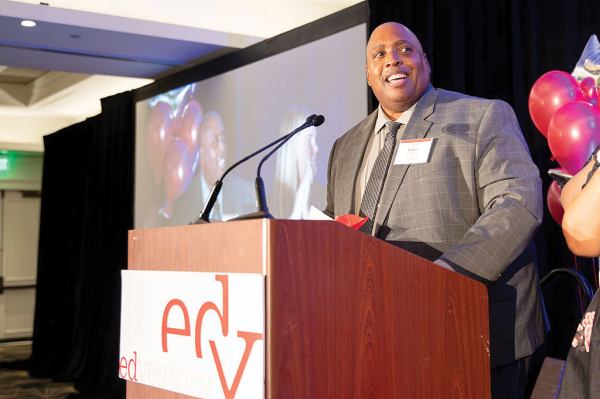
With principal Walter Henderson (above) at the helm, the Mattahunt reopened with a shared vision centered on students’ language and culture, academically rigorous instruction, and family and community engagement. Reporter file photo
Each year for nearly two decades, EdVestors has awarded a School on the Move prize to one of Boston’s most improved public schools to celebrate the bright spots within Boston Public Schools (BPS) and to share the effective practices that others can learn about and adopt from. As Boston and other districts across the Commonwealth welcome growing numbers of immigrant students and families, the strategies employed by the 2024 winner, Mattahunt Elementary School, offer valuable lessons for educators everywhere.
After years of chronically low performance, the Mattahunt was slated to close in July 2017. In response to community input, the school was relaunched the following fall, with the administration charged with building a new school from the ground up, serving students in grades K0 – K1, and adding a new grade each year after that.
With principal Walter Henderson at the helm, the Mattahunt reopened with a shared vision centered on students’ language and culture, academically rigorous instruction, and family and community engagement.
Boston is home to the third-largest Haitian population in the United States, a significant percentage of whom live in Mattapan. In response to the needs of their community, the Mattahunt pioneered the first-in-the-nation dual-language Haitian Creole program, the Toussaint L’Ouverture Academy.
As the leaders of the country’s first Haitian Creole dual-language program, Mattahunt teachers had to develop a comprehensive curriculum, including instructional materials and assessments in Haitian Creole, and build the necessary infrastructure to support Haitian students and their families. This was accomplished by hiring a full staff, including administrators, Haitian Creole-speaking teachers, a family liaison, operations coordinator, and a social worker.
The academy is structured to provide students with a comprehensive and balanced education in Haitian Creole and English, promoting students’ biliteracy, bilingualism, high academic achievement, and sociocultural competency. The response from the community has been so strong that the school now has a waiting list.
The Mattahunt has also focused on improving its instructional practices so that all students can access what they need to succeed in the classroom. Students who struggle with reading receive additional, targeted instruction three days a week. In the school’s inclusion classrooms, where students with and without disabilities learn together, teachers provide additional support to enhance learning. Teachers also work as teams to conduct classroom observations and collect and analyze student data. For example, teachers use an observation protocol to ensure they implement culturally and linguistically sustaining practices such that students feel seen, engage in deeper learning, and are held to high expectations with targeted support.
The Mattahunt has seen clear improvement in reading assessment scores, with 72 percent of students receiving additional support increasing their literacy by 1-2 levels (as measured by the MAP reading assessment). Multilingual learners at the Mattahunt outpace the progress of their peers across the district. In the 2023-2024 school year, 53 percent of multilingual learners at the Mattahunt progressed in English language acquisition compared to just 34 percent district-wide (as measured by the ACCESS assessment).
The Mattahunt is a Boston Community Hub School with relationships with local organizations such as Success Mentor, City Year, and Stop and Shop. The school launched initiatives like a food pantry for school families. It also partnered with Boston College and the Haitian Parent Organization to enrich educational programming and enhance student support.
This hub has strengthened connections with students and families. The Mattahunt actively involves students and families in school decision-making by using surveys and other outreach methods. When they discovered a demand for more after-school opportunities, the school responded by expanding free programs at the Mattahunt BCYF Community Center, which is co-located with the school. These offerings now include homework support, recreational classes, and more.
The Mattahunt uses multiple resources and strategies to help chronically absent students consistently return to school. They host family-friendly events, provide student incentives, and they have established a Student Engagement Action Team, helping families solve school attendance challenges. Chronic absenteeism has improved at the Mattahunt, dropping 14 percent from 2023 to 2024.
As schools and districts across Massachusetts and the country grapple with how best to support immigrant families and students, the Mattahunt is a shining example that we can look to right in Boston.
<em>
Marinell Rousmaniere is president and CEO of EdVestors, a Boston-based nonprofit school improvement organization.</em>
